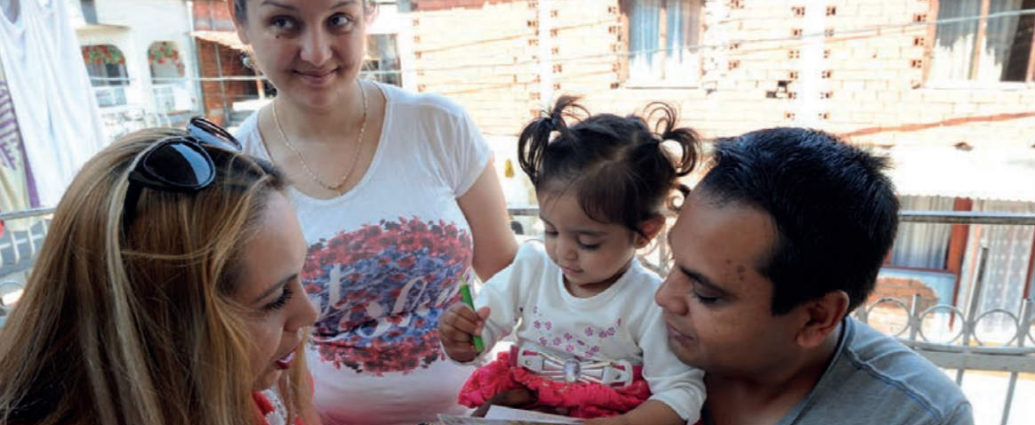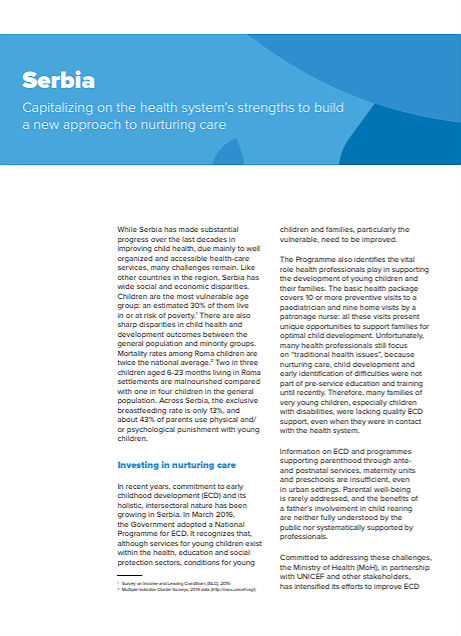While Serbia has made substantial progress over the last decades in improving child health, due mainly to well organized and accessible health-care services, many challenges remain. Like other countries in the region, Serbia has wide social and economic disparities. Children are the most vulnerable age group: an estimated 30% of them live in or at risk of poverty.1 There are also sharp disparities in child health and development outcomes between the general population and minority groups. Mortality rates among Roma children are twice the national average.2 Two in three children aged 6-23 months living in Roma settlements are malnourished compared with one in four children in the general population. Across Serbia, the exclusive breastfeeding rate is only 13%, and about 43% of parents use physical and/ or psychological punishment with young children.
Investing in nurturing care
In recent years, commitment to early childhood development (ECD) and its holistic, intersectoral nature has been growing in Serbia. In March 2016, the Government adopted a National Programme for ECD. It recognizes that, although services for young children exist within the health, education and social protection sectors, conditions for young children and families, particularly the vulnerable, need to be improved.
The Programme also identifies the vital role health professionals play in supporting the development of young children and their families. The basic health package covers 10 or more preventive visits to a paediatrician and nine home visits by a patronage nurse: all these visits present unique opportunities to support families for optimal child development. Unfortunately, many health professionals still focus on “traditional health issues”, because nurturing care, child development and early identification of difficulties were not part of pre-service education and training until recently. Therefore, many families of very young children, especially children with disabilities, were lacking quality ECD support, even when they were in contact with the health system.
Information on ECD and programmes supporting parenthood through ante- and postnatal services, maternity units and preschools are insufficient, even in urban settings. Parental well-being is rarely addressed, and the benefits of a father’s involvement in child rearing are neither fully understood by the public nor systematically supported by professionals.
Committed to addressing these challenges, the Ministry of Health (MoH), in partnership with UNICEF and other stakeholders, has intensified its efforts to improve ECD services. One strategy has been to pilot the provision of ECD services through regular paediatric health care, patronage nurses3 and developmental counselling units (DCUs)4 in 9 of the 168 primary health centres (PHCs) across Serbia. These services benefited over 17,500 children and their families (including 6,000 children from Roma communities) during the project period (mid 2014 – mid 2016).
Paediatricians, visiting nurses and DCU teams in these centres have undergone intensive ECD training. This has improved the quality of ECD services, including stimulation, identification of risks and early interventions, and enabled professionals to meet the needs of children from socially vulnerable families and of children with disabilities and their families. In addition, professionals are using new instruments, guidelines and tools to monitor child development more systematically, and to identify and respond to environmental risk factors that can negatively affect the child (violence, alcoholism, social vulnerability, mental health problems of parents, etc.).
To make services friendlier to families of young children and improve the quality of services, DCUs have been refurbished and equipped with appropriate didactic materials. In 2016, to better support the most vulnerable families, the MoH and UNICEF trained Roma health mediators5 in the different components of nurturing care.
Monitoring data6 show significant improvements in parental practices and child development. Paediatricians from nine PHCs reported that nearly 50% of Roma parents reduced risks to child development that had been identified, and engaged in play and other positive interactions with their children. Approximately 60% of children assessed with developmental difficulties showed some improvement after paediatric interventions. Parent-child interactions, as assessed by visiting nurses, improved from 59% to 78% overall, and from 46% to 70% in Roma families. Responsive feeding practices rose from 71% to 90% in all families, while age-appropriate play rose from 40% to 51%. The proportion of safe and stimulating family environments increased from 33% to 46% in Roma families after interventions by visiting nurses. Unfortunately, nonviolent disciplining changed only from 43% to 48% overall, and from 34% to 41% in Roma families. Based on these results, the MoH is working to introduce new instruments for assessing child development in the everyday practice of health professionals, and to establish DCUs in every district. New national guidance for patronage nurses have been drafted which promotes their engagement in ECD and nurturing care: these topics are now formally integrated within the scope of their work.
| The Ministry of Health is extremely proud of the results of the project to improve the primary health care of the youngest children, thanks to which developmental counselling units in nine primary health centres have opened their doors in the last two years. These units have been instrumental in detecting developmental delays, and in providing timely and expert support to help children and families to overcome them. State Secretary, Ministry of Health of the Republic of Serbia |
|---|
Introduction of developmental paediatrics was initiated in 2016 through elective courses for medical students and a revised paediatric syllabus, with a parallel process being introduced in nursing schools. Since 2016, MoH has supported the opening of parenting schools in PHCs across Serbia. A 24-hour telephone counselling service for parents, established by the City Institute of Public Health of Belgrade in 2002 with support from UNICEF, has been strengthened and is now financially supported by the Government and the local community. Recognition that ECD requires support from and collaboration between different sectors and stakeholders is growing (see Box 1).
| Box 1. The Government of Serbia makes a cross-sector commitment to ECD In March 2018, after strong advocacy by UNICEF, the “Call for action: development for each child and society” was signed by Serbia’s ministers for health, education and social welfare and by the President of the Council for Child Rights. Thus the Government has positioned ECD at the top of its national agenda, and committed to addressing equity gaps, in order to benefit every child and family in Serbia. At the local level, eight municipalities signed memorandums of understanding, pledging that all relevant sectors would jointly support ECD and nurturing care. Stronger collaboration is needed to reach the most vulnerable children and their families, particularly socially and economically- deprived Roma and children with developmental difficulties and disabilities. Co-operation to develop one individualized development support plan for a child and his/her family is ongoing in 2018. The ministries of health, education and social welfare have also partnered with UNICEF in the three-year Early Moments Matter campaign, launched in 2017. |
|---|
Looking forward

The MoH is committed to strengthening ECD support to children and their families across the country in a sustainable manner, particularly to meet the needs of the most vulnerable families. New guidelines and support for capacity-building programmes for visiting nurses, paediatricians and other health professionals, together with the mobilization of local intersectoral teams, will help ensure that all children and their families have access to guidance and support for nurturing care. In addition, expanding nurturing care programmes for parents – including parenting schools, information and educational campaigns and counselling services – will remain a priority for several years to come.
| Patronage nurses in Serbia ... help families to recognize their own capacities and identify solutions for challenges they face. Through regular home visits nurses build partnership with families based on mutual respect and confidence. For the most vulnerable cases they provide links to community resources based on a needs assessment. Manager of the capacity-building programme for home visiting nurses, Institute of Public Health, Belgrade. |
|---|
For more information, please contact NurturingCare@who.int
Endnotes
1 Survey on Income and Living Conditions (SILC), 2015
2 Multiple Indicator Cluster Surveys, 2014 data (http://mics.unicef.org/).
3 Patronage nurses make home visits to families with young children and are particularly important for vulnerable populations. They assess protective and risk factors in the family, and empower and educate family members.
4 Composed of a team of multidisciplinary professionals, DCUs in primary health-care centres provide services to children with developmental risks and difficulties and their families.
5 Roma Health Mediators are extended arm of the health system towards the most vulnerable Roma families. They work within patronage nurse services in the PHCs and are employed to assist Roma families obtain right to health and other entitlements. Since 2009, MoH has employed 85 of them throughout Serbia.
6 Routine data collected from facilities during the implementation of the ECD capacity building project in 10 primary health-care centres throughout Serbia (mid 2014–mid 2016). Projects implemented by the Pediatric Association of Serbia and the Institute of Public Health of Belgrade under the MoH and UNICEF co-operation framework.
Acknowledgements:
This profile was developed in support of Nurturing Care for Early Childhood Development. A framework for helping children to survive and thrive to transform health and human potential.
Writers: Jelena Zajeganovic Jakovljevic, UNICEF, Svetlana Jankovic Mladenovic, Institute of Public Health, Belgrade, and Vesna Knjeginjic,
Sector for Public Health, MoH.
Contributors to development and review: Matthew Frey, Bettina Schwethelm. Design: PATH and UNICEF, Serbia.






